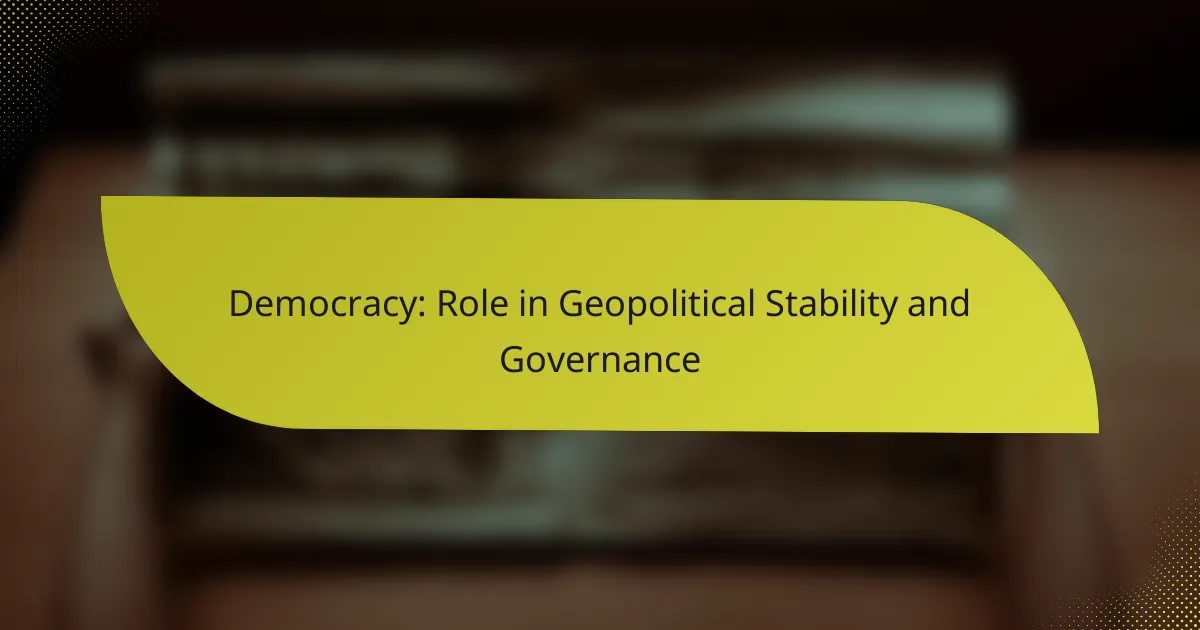Democracy plays a crucial role in promoting geopolitical stability by enabling citizens to engage in dialogue and resolve conflicts peacefully. However, it faces challenges such as populism, authoritarian influences, and political polarization, which can threaten democratic institutions. Strengthening democratic governance through institutional enhancement and civic engagement is essential for fostering resilience and stability on a global scale.
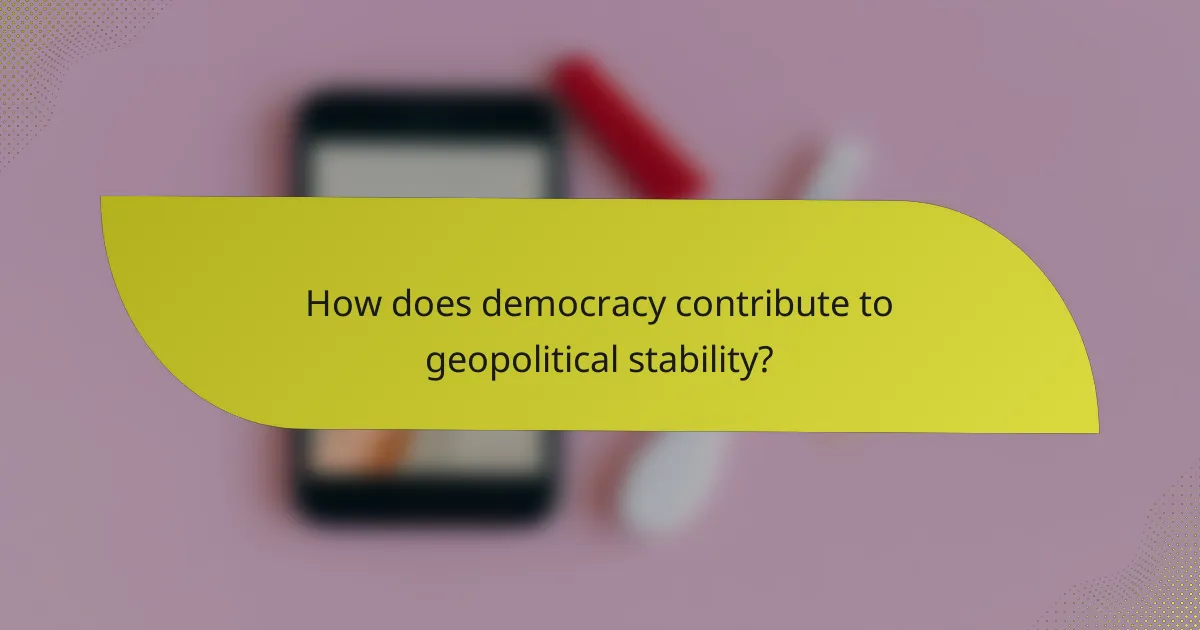
How does democracy contribute to geopolitical stability?
Democracy contributes to geopolitical stability by fostering a political environment where citizens can express their views and resolve conflicts peacefully. This system encourages dialogue and cooperation, reducing tensions both domestically and internationally.
Promotes peaceful conflict resolution
Democratic systems enable open dialogue among citizens and leaders, allowing for peaceful negotiation of differences. When conflicts arise, established legal frameworks and institutions facilitate mediation, reducing the likelihood of violence.
For instance, countries with democratic governance often have mechanisms like courts and arbitration panels that help resolve disputes without resorting to force. This approach not only stabilizes internal relations but also sets a precedent for international conflict resolution.
Encourages international cooperation
Democracies are more likely to engage in cooperative international relationships, as they tend to share common values such as human rights and rule of law. This shared commitment fosters alliances and partnerships that enhance global stability.
For example, democratic nations often participate in international organizations, such as the United Nations or NATO, where they collaborate on security and development issues, promoting a collective approach to global challenges.
Enhances legitimacy of governance
In democracies, governance is based on the consent of the governed, which enhances its legitimacy. When citizens feel represented and heard, they are more likely to support their government, leading to a stable political environment.
Legitimacy also fosters trust in institutions, which is crucial for maintaining order and preventing unrest. Countries with high levels of political legitimacy often experience lower rates of civil disobedience and protests.
Fosters economic development
Democratic governance creates an environment conducive to economic growth by promoting transparency and accountability. Investors are more likely to engage in markets where they can trust the legal and regulatory frameworks.
Moreover, democracies often prioritize social welfare and public services, which can lead to improved living standards and economic opportunities for citizens. This economic stability contributes to overall geopolitical stability.
Reduces risks of authoritarianism
Democracy inherently limits the concentration of power, reducing the risk of authoritarian regimes taking hold. By ensuring checks and balances, democratic systems prevent the emergence of leaders who may exploit their position for personal gain.
Countries with strong democratic institutions are better equipped to resist authoritarian tendencies, which can destabilize regions and lead to conflict. Maintaining democratic practices is essential for long-term stability and peace.
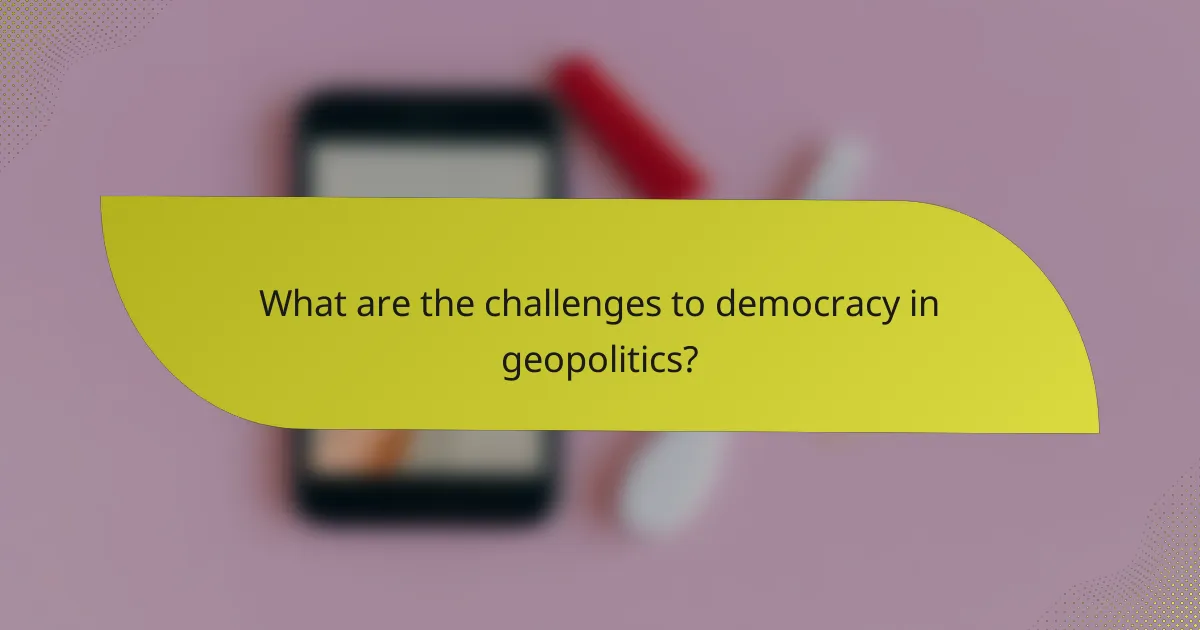
What are the challenges to democracy in geopolitics?
Democracy faces significant challenges in the realm of geopolitics, including the rise of populism, the influence of authoritarian regimes, cybersecurity threats, and political polarization. These factors can undermine democratic institutions and processes, leading to instability and conflict.
Rise of populism
The rise of populism poses a direct challenge to democratic governance by promoting divisive rhetoric and undermining established political norms. Populist leaders often appeal to public discontent, promising to represent the “common people” against perceived elites, which can erode trust in traditional political institutions.
In many cases, populist movements exploit economic grievances, social issues, or nationalistic sentiments to gain support. This can lead to policies that prioritize short-term gains over long-term democratic stability, often resulting in increased tension within society.
Influence of authoritarian regimes
Authoritarian regimes can destabilize democracies by exporting their models of governance and undermining democratic movements worldwide. These regimes may engage in disinformation campaigns, support anti-democratic parties, or provide resources to undermine electoral processes in democratic nations.
For instance, countries with authoritarian governments may actively interfere in elections or political discourse in democracies, aiming to create divisions and weaken public trust in democratic institutions. This external influence can significantly impact the political landscape and governance in affected nations.
Cybersecurity threats
Cybersecurity threats are increasingly relevant in the context of democracy, as they can compromise electoral integrity and public trust. Cyberattacks can target election infrastructure, manipulate information, and spread disinformation, which can confuse voters and distort democratic processes.
Governments must invest in robust cybersecurity measures to protect against these threats, including securing voting systems and educating the public about misinformation. Collaboration with international partners can enhance resilience against cyber threats that aim to disrupt democratic governance.
Political polarization
Political polarization can severely hinder democratic governance by creating an environment where compromise becomes difficult. As political factions become more extreme, dialogue and cooperation diminish, leading to gridlock and increased hostility among citizens.
Addressing polarization requires efforts to promote civic education and encourage constructive discourse. Initiatives that foster understanding and collaboration across political divides can help rebuild trust in democratic institutions and processes, ultimately contributing to greater stability.
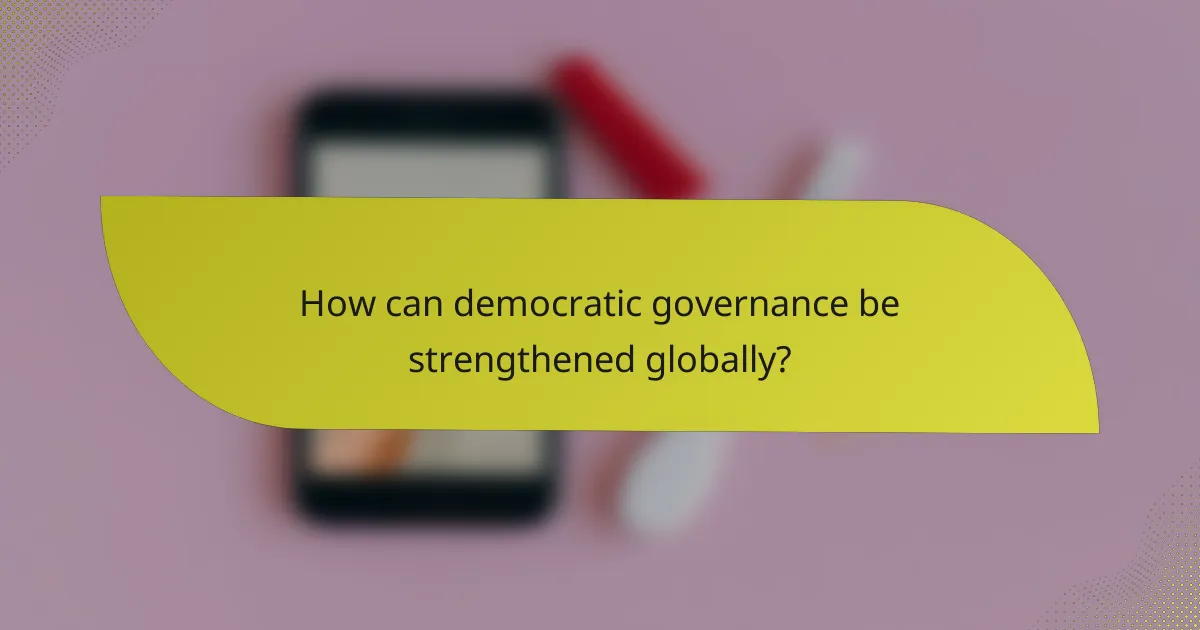
How can democratic governance be strengthened globally?
Strengthening democratic governance globally involves enhancing institutions, fostering civic engagement, and reforming electoral processes. These efforts can create more resilient democracies that contribute to geopolitical stability.
International support for democratic institutions
International support plays a crucial role in strengthening democratic institutions. This can include financial aid, technical assistance, and sharing best practices among nations. For example, organizations like the United Nations and the European Union often provide resources to help countries develop their legal frameworks and governance structures.
Moreover, partnerships between established democracies and emerging ones can facilitate knowledge transfer and capacity building. Countries can benefit from mentorship programs that focus on rule of law, human rights, and transparent governance.
Promotion of civil society engagement
Engaging civil society is essential for a vibrant democracy. This includes encouraging citizen participation in decision-making processes and supporting non-governmental organizations (NGOs) that advocate for democratic values. Active civil societies can hold governments accountable and promote transparency.
Governments should create an enabling environment for civil society by ensuring freedom of expression and assembly. This can involve protecting the rights of activists and providing platforms for public discourse, which can lead to more informed and engaged citizens.
Implementation of electoral reforms
Electoral reforms are vital for ensuring fair and transparent elections. This may involve updating electoral laws, improving voter registration processes, and ensuring the integrity of the voting system. Countries should consider adopting technology that enhances security and accessibility, such as electronic voting systems.
Additionally, reforms should focus on reducing barriers to participation, such as voter ID laws that may disproportionately affect certain groups. Establishing independent electoral commissions can also help oversee elections and ensure that they are conducted fairly.
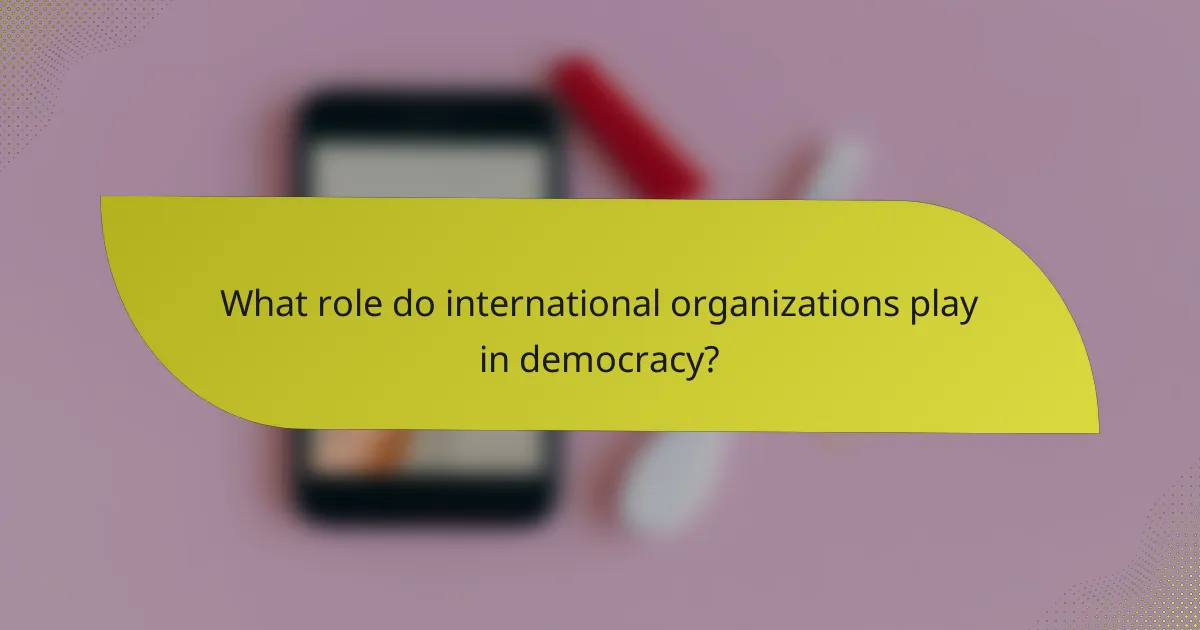
What role do international organizations play in democracy?
International organizations play a crucial role in promoting and sustaining democracy by providing support, resources, and frameworks for democratic governance. They facilitate collaboration among nations to uphold democratic principles and ensure that democratic processes are respected and maintained.
Facilitate democratic transitions
International organizations assist countries in transitioning to democracy by offering guidance and support throughout the process. This can include providing frameworks for constitutional reforms, facilitating dialogue among political factions, and promoting inclusive governance practices.
For example, organizations like the United Nations and the European Union often engage in diplomatic efforts to mediate conflicts and encourage peaceful transitions. These efforts can help stabilize regions undergoing significant political change.
Monitor elections
Monitoring elections is a key function of international organizations, ensuring that electoral processes are free, fair, and transparent. They deploy observers to assess various aspects of the electoral process, including voter registration, campaign practices, and the counting of votes.
Organizations such as the Organization for Security and Co-operation in Europe (OSCE) and the Carter Center provide independent assessments that can enhance public confidence in election outcomes. Their reports often highlight areas for improvement, contributing to the overall integrity of future elections.
Provide technical assistance
International organizations offer technical assistance to strengthen democratic institutions and processes. This support can include training for election officials, developing legal frameworks, and enhancing civil society’s capacity to engage in governance.
For instance, the United Nations Development Programme (UNDP) provides resources and expertise to help countries build robust electoral systems and promote civic education. Such initiatives are vital for fostering an informed electorate and ensuring the sustainability of democratic practices.
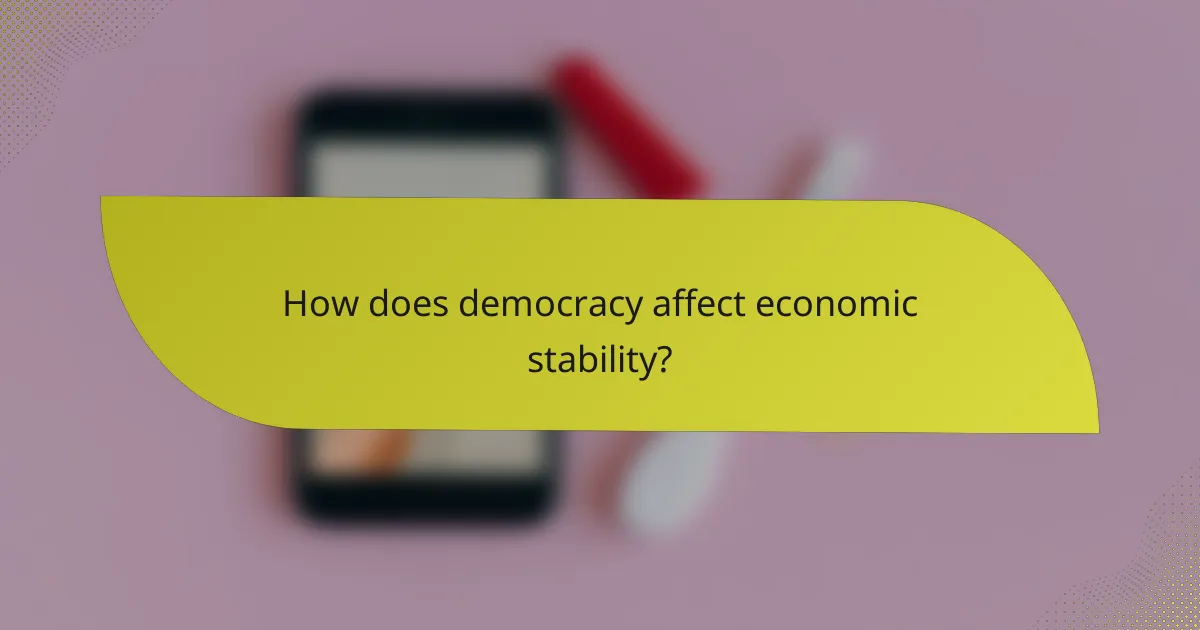
How does democracy affect economic stability?
Democracy can significantly enhance economic stability by fostering transparent governance and promoting the rule of law. These factors create a favorable environment for business operations and economic growth, which can lead to increased prosperity for citizens.
Encourages foreign investment
Democratic nations often attract more foreign investment compared to authoritarian regimes due to their stable political environments and predictable legal frameworks. Investors are more likely to commit capital in countries where they can trust that their rights will be protected and that there will be a fair process for dispute resolution.
For instance, countries in the European Union, which uphold democratic principles, tend to see higher levels of foreign direct investment (FDI) than those with less democratic governance. This investment can lead to job creation, technology transfer, and overall economic growth.
To maximize foreign investment, democracies should focus on maintaining political stability, ensuring regulatory transparency, and fostering a business-friendly climate. Common pitfalls include excessive bureaucracy and corruption, which can deter potential investors.
